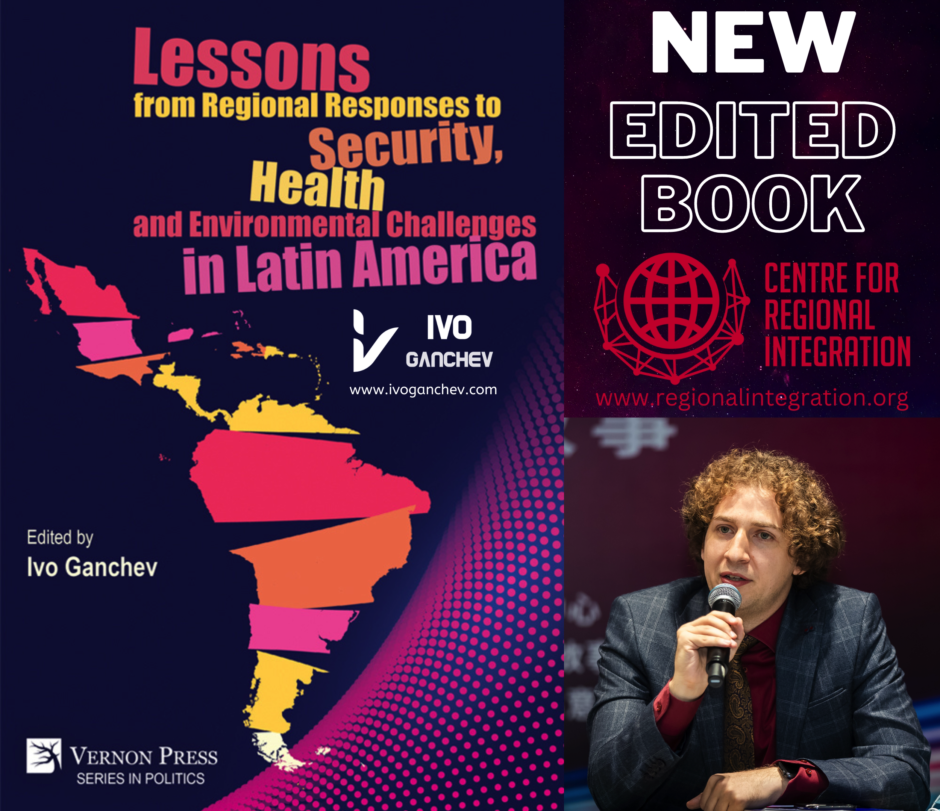New Edited Book on Latin American Regionalism by Dr. Ivo Ganchev
What is the role of regional organizations in maintaining security across different parts of Latin America and the Caribbean (LAC)? How did COVID-19 impact states in the region and what types of collective action have helped respond to public health emergencies? In what way is LAC environmental policy formulated and what broader lessons can be drawn for the Global South?
These important questions are addressed in a brand-new book which was edited by the Founding Director of the Centre for Regional Integration, Dr. Ivo Ganchev. The volume is titled “Lessons from Regional Responses to Security, Health and Environmental Challenges in Latin America”, and it was published by Vernon Press in early 2024. The book is available to purchase globally through the publisher, Amazon, various other platforms, as well as bookstores near you.
The introduction can be freely downloaded from ResearchGate and Academia.edu.
The edited volume reveals the reasons behind the successes and failures of LAC regional responses to collective challenges as well as their limitations and potential for future improvement. It contains 11 chapters, authored by 16 authoritative academics who employ methodologically diverse perspectives. Each chapter provides insights that would be of interest to scholars, students and policymakers working on the regional governance of LAC and the Global South. The contributions are thematically organised in three parts and produced with pragmatic considerations in mind, discussing existing and potential real solutions to pressing issues.
Throughout the publication process, Dr. Ganchev received ample support from various organizations and individuals. In particular, he would like to thank Vernon Press for their trust in this project, his team at the Centre for Regional Integration for their ongoing support as well as all the contributors who made this project possible.
The book has received a warm welcome from the academic community. Prof. José Antonio Sanahuja (Complutense University, Spain), a central figure in the study of regionalism, has praised “the excellent and innovative set of studies in the book [which] sheds light on [regionalism] and serves as an important contribution to the literature”. Another leading authority in this field, Prof. Roberto Domínguez (Suffolk University, USA), predicts that this volume “will become an essential reading for analyzing Latin American regionalism”. Similarly, Dr. Devika Misra (O. P. Jindal Global University, India), Dr. Arkadiy Eremin (Webster University) and Dr. Melisa Deciancio (FLASCO, Argentina), have spoken highly of the book, and provided ample praise for the efforts of the editor and the contributors.
A full list of the chapter titles and authors is available below.
PART I: REGIONAL RESPONSES TO COLLECTIVE SECURITY CHALLENGES
Chapter 1. Responses of Latin American organizations to coup attempts: Power play between political ideologies in post-hegemonic regionalism
Ivo Ganchev, Centre for Regional Integration
Chapter 2. The impact of deglobalization on the security agenda of contemporary Latin American regionalism
Kseniya Konovalova and Victor Jeifets, Saint-Petersburg State University
Chapter 3. Security governance in the Andean borderlands: Hybrid formations and the rising armed violence
Rafael A. Duarte Villa and Camila de Macedo Braga, University of São Paulo
Rafael Enrique Piñeros Ayala, Externado University of Colombia
Chapter 4. Lessons from forced partnerships: The Alliance for the Prosperity of the Northern Triangle (2015–2020)
Miguel Gomis, Pontificia Universidad Javeriana
PART II: REGIONAL RESPONSES TO COLLECTIVE HEALTH CHALLENGES
Chapter 5. Institutional factors influencing the success of Latin American organizations confronting epidemics
Octavio M. González Segovia, Hurtado University
Alfonso Sánchez Mugica, National Autonomous University of Mexico
Chapter 6. The impact of COVID-19 on the national power of Latin American countries
Daniel Morales Ruvalcaba, Sun Yat-sen University
Chapter 7. Regional integration and presidential elections in Latin America in the context of COVID-19
Ignacio Medina Núñez, El Colegio de Jalisco
Chapter 8. Interactions of Brazil, Peru, and PAHO in overcoming the effects of COVID-19
Alla Yurievna Borzova, Peoples’ Friendship University of Russia
PART III: REGIONAL RESPONSES TO COLLECTIVE ENVIRONMENTAL CHALLENGES
Chapter 9. MERCOSUR’s environmental policy: Institutional evolution and limitations
Tatiana de Souza Leite Garcia, University of São Paulo and Inter-American Institute for Cooperation on Agriculture
Chapter 10. Regional environmental efforts in Mesoamerica: Achievements and modes of cooperation
Alina Gamboa Combs and Dircea Arroyo Buganza, Universidad Anáhuac México
Chapter 11. Lessons from the Escazú Agreement for environmental and human rights protection in Africa
Fernand Guevara Mekongo Mballa, Centre for Regional Integration and Catholic University of Central Africa
For more information, explore the book blurb and Dr. Ivo Ganchev’s other publications in the Read section of this website.










